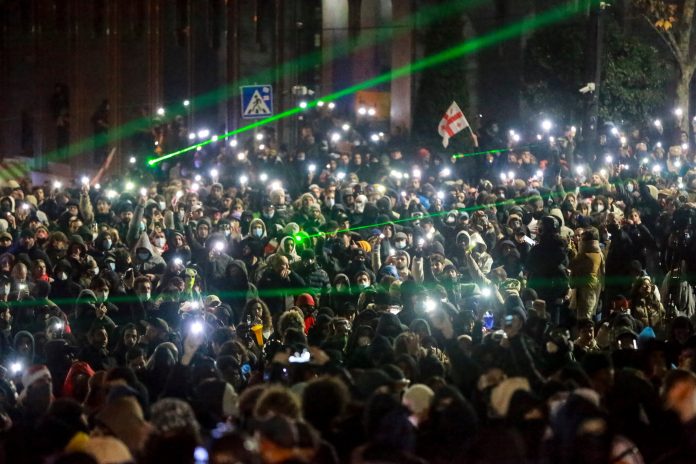Violent protests and clashes with police officers have been ongoing in Georgia for the fifth day, triggered by the decision of the ruling Georgian Dream party to postpone EU accession talks.
Mass street protests, similar to the Ukrainian unrest in 2013-2014, turned violent after Prime Minister Irakli Kobakhidze announced on 28 November that the authorities were dropping EU accession talks until the end of 2028 and that Tbilisi was rejecting European financial aid.
Kobakhidze stated that the EU was using the negotiations “as a tool to blackmail our country and split society” and demanded no reforms from Georgia, “but only steps that mean giving up dignity.” Among the demands listed by the bloc were the cancellation of the law on NGO transparency, the repeal of the anti-LGBT propaganda law, the introduction of sanctions and the release of former President Mikheil Saakashvili.
Even before the opposition made any statements on the postponement of EU accession talks, people began to gather in Tbilisi, Batumi, Gori, Zugdidi and Kutaisi. President Salome Zurabishvili joined the demonstrations in the capital, declaring that she would not leave her post despite the expiring presidential term.
Meanwhile, Lithuanian presidential adviser Asta Skaisgirytė said Lithuania was ready to grant asylum to Zurabishvili “if necessary.”
Protests gain momentum
Local media shared footage of a protester attacking a riot police officer:
Later, media outlets published video of the arrest of a fireworks shooter:
On Monday evening, protesters gathered near the Georgian parliament in Tbilisi, but police pushed them back into the streets near Tbilisi State University. Special forces were reportedly forced to use water cannons to disperse the protesters and extinguish bonfires. One such blaze was lit on the roadway in the middle of Shota Rustaveli Avenue.
In response, protesters paralysed the streets leading to the university. They erected barricades made of bins, iron constructions, chairs and other objects, according to local media.
A man who set fire to a water cannon with a Molotov cocktail on Sunday faced up to seven years in prison, the Georgian Interior Ministry reported. So far, five people have been detained on criminal charges of assaulting police officers and damaging other people’s property during the protests. Critics also accuse the protesters of attempting a coup d’état, as happened in Ukraine after the public unrest in Kyiv called Euromaidan.
Georgian protesters not only disrupted CCTV cameras outside the Tbilisi Opera and Ballet Theatre, but also erected barricades and provoked a fireworks shootout with riot police.
Someone even recorded footage of a man allegedly hiding a gun during the protests.
The activists also attacked an Orthodox priest who accused them of supporting murderers and called them instigators.
